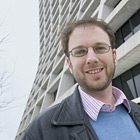From the editor: Budget progress
 |
The Fiscal Year 2008 budget request has just been released by the President of the United States. At the roughest cut of the figures, the FY08 high-energy physics program within the Department of Energy gets a 12% increase over the enacted FY06 budget level. (Comparisons with FY07 are not meaningful as Congress had not yet passed a budget at the time we went to print.)
The FY08 increase takes the place of a similar request in FY07. Given that there had not been much budgetary growth for particle physics in recent years, any increase is welcome at this time, and these requests are a positive sign.
Not all members of the particle physics community will see the FY08 budget request as good news since money would be shifted from one research program to another and some research efforts would see delays.
This process is a stark reminder for all scientists about how money is allocated and who decides how money is spent in the United States: the people, through their elected representatives.
Scientists are beholden to the people who provide their funding. That’s how it should be. As a result, scientists’ proposals will only be enacted if they are consistent with a government’s priorities.
The particle physics community has conducted a few prioritization analyses of their own, including the P5 report mentioned in Abe Seiden’s commentary. Those analyses are meant to provide advice and guidance, and the FY08 request reflects some of the priorities established by the particle physics community. In particular, R&D for the International Linear Collider would receive $60 million. With this item being one of the highest established priorities in particle physics, the strategic work by the community begins to pay off.
In the reality of the current US budget climate, there are further steps the physics community should take. It should continue to present its achievements, prove that it is using its funds wisely, and ask to launch new research initiatives when the budgetary circumstances are right. Pushing too hard too soon will only attract a “No” for an answer, the last thing research-driven physicists would like to hear. Right now, the priority for physicists is to do what they can to ensure the US Congress passes a budget that satisfies their needs.
David Harris, Editor-in-chief
Click here to download the pdf version of this article.


